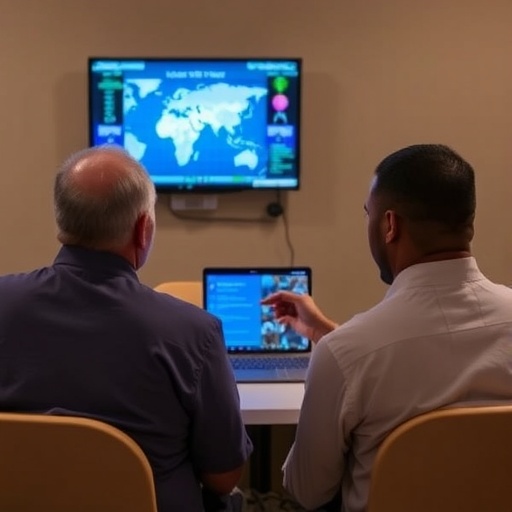In the rapidly evolving landscape of oncology supportive care, a groundbreaking study published in the November 2025 issue of the Journal of the National Comprehensive Cancer Network (JNCCN) shines a critical light on the comparative effectiveness of team-based versus technology-driven approaches. This multi-site, cluster-randomized trial offers compelling evidence that community-driven, interpersonal support frameworks significantly outperform technology-centered models in delivering patient-centric supportive care to individuals battling cancer.
The study encompassed 26 diverse cancer clinics, ranging from academic and community institutions to veterans’ affairs and safety-net settings, ensuring broad representativeness across healthcare environments. The experimental design distinctly segregated clinics into two arms: one employing a team-based approach leveraging community health workers and peer support structures, and the other prioritizing technology-based interventions focused on optimizing electronic medical records (EMRs) to facilitate symptom management and care coordination.
Remarkably, results demonstrated that an overwhelming 87.5% of participants involved in the team-based clinics perceived their model as more conducive to enhancing patient care outcomes, contrasted starkly with just 25% in the technology-based counterparts. This stark disparity underscores the nuanced limitations of purely technological solutions, which, while valuable, cannot fully replicate the interpersonal insight and empathetic engagement intrinsic to human-led support systems.
The research protocol included rigorous preparatory training for clinical teams, ensuring fidelity to intervention models. Data collection utilized a robust mixed-methods framework: a detailed 71-question online survey complemented by in-depth one-on-one interviews, affording comprehensive insight into practitioner perceptions, operational challenges, and contextual factors affecting implementation and sustainability.
Senior investigator Dr. Manali Patel of the Stanford Cancer Institute highlighted the unexpected degree of enthusiasm for community health worker involvement, emphasizing that peer support networks not only address symptom management but also align closely with patients’ goals, values, and preferences. This patient-centered ethos is essential in oncology, where individualized care trajectories and psychosocial dynamics profoundly influence therapeutic success and quality of life.
The study also revealed crucial financial and infrastructural insights. Only about one-third of respondents believed their centers had sufficient funding to sustain and expand team-based supportive care, while slightly more—37.5%—felt capable of scaling technology-based interventions beyond the trial’s confines. This funding gap brings to the fore the challenge of embedding supportive care within the broader oncology ecosystem, where resource allocation and administrative buy-in are pivotal.
Moreover, organizational culture emerged as a powerful moderating variable. A majority of participants in both study arms reported leadership receptiveness to innovation: 75% in team-based clinics and 62.5% in technology-based clinics acknowledged openness to care process adaptations. This leadership engagement is a critical lever for systemic change, enabling long-term integration of effective supportive strategies into routine clinical workflows.
Cancer experts outside the study, such as Dr. Loretta Erhunmwunsee of City of Hope, have corroborated these findings by emphasizing the need to transcend the dichotomy between technology and teams. She posits that the future lies in synergistic systems where digital tools enhance, rather than replace, human connection and equity-driven care systems, thereby driving continuity, equity, and personalized experiences for cancer patients.
Further, Dr. Patel articulated the broader economic and clinical implications of adopting supportive care models that prioritize symptom control and advance care planning discussions. Evidence suggests such proactive interventions can significantly reduce avoidable hospital visits, thereby generating substantial cost savings while elevating patient quality of life.
This comprehensive investigation contributes novel empirical data to the ongoing discourse regarding supportive cancer care delivery, challenging prevailing assumptions about the primacy of technology-centric solutions. It advocates for recalibrating healthcare strategies to valorize human capital, particularly community health workers, whose frontline engagement offers nuanced understanding and tailored support unavailable through digital systems alone.
For oncologists, healthcare administrators, and policymakers, these findings represent a clarion call to critically evaluate resource distribution, training priorities, and system design. Embracing team-based frameworks augmented by selective technology can redefine standards of care, fostering environments where patients feel heard, prioritized, and holistically supported throughout their cancer journey.
Clinicians and researchers are encouraged to delve into the full study, entitled “Team-Based Versus Technology-Based Supportive Cancer Care: A Mixed Methods Study of Multi-Site Implementation,” available through JNCCN.org. The publication offers an exhaustive presentation of methodology, survey responses, and critical discussions that underpin these pivotal insights.
As the oncology community confronts burgeoning demands for supportive care amidst technological advancements, this study underscores the indispensable value of human-centered approaches. It serves as a powerful reminder that technology, while transformative, reaches its full potential only when embedded within dedicated, empathetic, and resource-supported teams committed to equitable patient care.
This research not only refines understanding of effective supportive care modalities but also sets a roadmap for future investigations and implementations that prioritize patient experience and real-world applicability. Ultimately, the intersection of human expertise and digital innovation may herald a new era of oncology care, characterized by enhanced outcomes, reduced disparities, and sustained patient empowerment.
Subject of Research: People
Article Title: Team-Based Versus Technology-Based Supportive Cancer Care: A Mixed Methods Study of Multi-Site Implementation
News Publication Date: November 10, 2025
Web References:
JNCCN Journal
Full Study DOI
Image Credits: NCCN
Keywords: Cancer, Health care, Human health, Doctor patient relationship, Health care delivery, Health counseling, Nursing, Oncology, Cancer patients
Tags: community-driven healthcare modelseffectiveness of peer support in cancerelectronic medical records in cancer carehuman touch in supportive careinterpersonal support in healthcareJNCCN study on cancer supportmulti-site cancer clinic researchoncology clinical trial findingspatient-centric cancer caresupportive cancer careteam-based cancer treatmenttechnology vs human support in oncology





